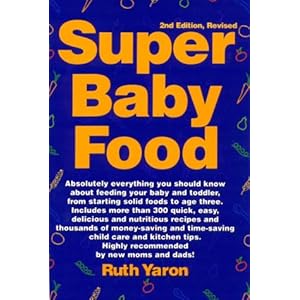A question posed on my neighborhood list serve about feeding toddlers caught my eye.
Hello moms,
I am looking for a book that discusses eating, behavior, learning (everything) on raising a 12 m growing boy.
This is the fourth time I had heard this question in as many weeks, so I thought that my reply might be worthy of a blog post.
 My favorite book about what to feed toddlers is Ruth Yaron’s “Super Baby Food“.
My favorite book about what to feed toddlers is Ruth Yaron’s “Super Baby Food“.
It was my go-to bible for many years and I still use it as a reference source even though my kids now eat just about anything adults eat. She has great suggestions and recipes for everything from baby food purees to healthy finger foods and snacks.
One of the things I found most helpful in this book was the schedule for introducing babies to new foods. Even if she doesn’t inspire you to prepare your own wholesome baby food, you’ll get great ideas for making healthy and nutritious toddler foods.

